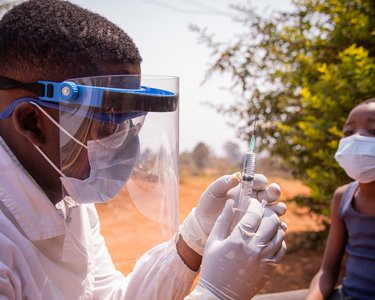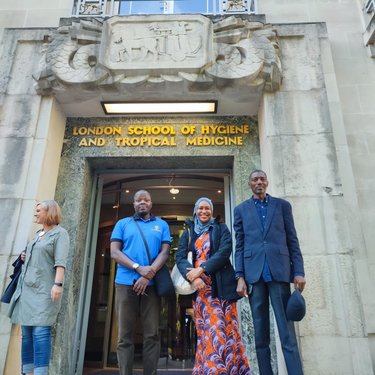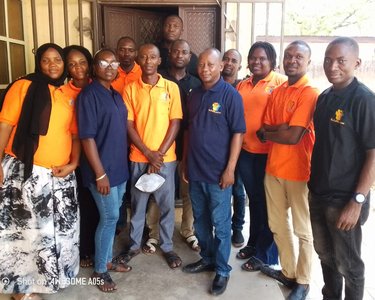
As part of our ongoing PULSE project, which seeks to build a robust evidence base and a supportive network for community-led vaccine deployment strategies, we’ve teamed up with the Childcare and Wellness Clinics (CWC).
CWC, a leading research centre affiliated with a health clinic in Abuja and conducting work across Nigeria, has recently received a dedicated grant to strengthen research and innovation capacity in humanitarian contexts.
In this blog, Yashua from CWC shares insights into how this funding has helped to advance the PULSE project and further the reach of community-centered healthcare initiatives across Nigeria.
As the Head of Research at Childcare and Wellness Clinics (CWC), it always bothered me that we constantly had to bring in outside consultants to fill our qualitative research needs. It wasn't that we didn't value this kind of research – quite the opposite! We valued this kind of work deeply; in fact, we were eager to cultivate our own team. Yet, every time we requested funding for training staff from the facility, we were passed over. Instead, the focus was on acquiring more equipment, like another x-ray machine. This constant push, albeit well-intentioned against our ambition, left our staff as potential researchers underutilised and unfulfilled.
When we received a capacity-building grant for a research project from the UK Humanitarian Innovation Hub (UKHIH), everything changed. The excitement in our department was incredible! This was our chance to develop the skilled research team we had dreamed of finally.
Qualitative research matters
At CWC, we have always firmly believed in the power of qualitative research. We always believed that research is more than just crunching numbers and gathering data for field projects. It is about truly understanding the human side of healthcare. It is about listening to our patients' stories, understanding their experiences, and seeing the world through their eyes. That is how we gain the insights we need to provide what we believe to be truly patient-centered care.
For us, this grant represented more than just financial support; it signified an opportunity to impact the lives of our patients significantly and, indirectly, the broader Nigerian community. By empowering our team with qualitative research skills, we are not just building expertise but promoting a culture of curiosity and understanding.
A journey of empowerment
Once our training program was approved, we jumped into action! To ensure we had the right people for our training program, we contacted our mentors in each location and asked them to identify staff members with a genuine research interest. We sought out those who had shown a spark for qualitative research by expressing their interest or participating as assistants in past studies. It was important to us that the participants were enthusiastic about learning and passionate about using their new skills in future research, contributing to our mission of improving healthcare. We crafted a comprehensive curriculum, integrating it with our Pulse project training for citizen ethnographers, supported by UKHIH, the London School of Hygiene and Tropical Medicine, and the University of Geneva.
We took the training on the road, bringing it to life in three cities in Northern Nigeria: Kano, Adamawa, and Maiduguri. Seventeen members of our CWC team, including some of our dedicated humanitarian staff, joined us for the training. To ensure one on one support, we assigned a senior researcher as a mentor to each location. These mentors provided guidance throughout the training and continued supporting the participants afterward.
Our training covered various qualitative research methods, from conducting interviews and focus groups to more advanced ethnographic studies. It was standardised and took place over three days, filled with interactive activities, discussions, and hands-on fieldwork.
After immersing themselves in theory, our team members had the opportunity to practice their new skills. They chose topics of interest, ventured into the community, and gathered invaluable real-world insights, always with mentorship support.
Another highlight of the grant was the opportunity to present our preliminary research findings at the London School of Hygiene and Tropical Medicine's Anthropology seminar.This presentation was a significant milestone for our senior research team, allowing them to share their knowledge and connect with colleagues internationally. The event was well-attended, with many of our hospital staff tuning in virtually to witness this proud moment for our organisation. This experience served as a testament to the impact of the capacity-building grant, not only in strengthening our research skills but also in fostering collaboration and knowledge exchange on an international scale.
The ripple effect of shared learning
The benefits of this experience went beyond just new skills; it led to unexpected growth. Staff gained a deeper understanding of qualitative research and newfound confidence in designing and leading their projects. Seeing some of them explore new career paths within CWC was heartening. Training staff internally also boosted morale, helping everyone envision a role in this initiative.
Rebecca Chindo, humanitarian staff from the Maiduguri NADI branch, expressed her gratitude after the training: "I learned so much about qualitative research. I'm confident I can use these skills to make a difference in my community."
What truly stood out was the sense of community that formed during this training. Staff from different departments connected exchanged ideas and built a strong support network. Since then, they have collaborated on various projects, cementing lasting friendships.
"They've achieved so much together since the training," observed Amina Nur a mentor from our CWC/NADI team. "They've become a supportive community; it is inspiring to watch."
Nurse Ane Uche stated that the training was a game changer for her and gave her the unique ability to now see healthcare from the perspective of those who are facing unique challenges particularly in rural areas, a demographic she typically wouldn’t have met at the clinic, she is looking forward to further developing a career as a qualitative researcher.
Every journey has its expected twists and turns, and ours was no exception; the overall experience was very positive, and whatever challenges encountered will be used to enhance future trainings.



A brighter future ahead
The support from UKHIH has enabled us to equip our staff with the training and resources needed to conduct high-quality research that truly impacts our patients’ lives. We are incredibly grateful for this support and look forward to building on it as we continue to demonstrate the remarkable success of this programme.
"Having this ready group of researchers has made it easier for the organisation to conduct research effectively," explained Umar Tarajim, one of the mentors. "It also enables us to maintain the quality of our work and ensure that things are done properly."
This journey has reinforced our belief in the power of shared learning and the incredible things that can happen when we invest in our team. We are proud of our staff for their dedication to learning and their commitment to providing high-quality patient care. Their passion and dedication inspire us all.
We are also proud of our partnership with the University of Geneva, the London School of Hygiene and Tropical Medicine, and UKHIH, which has enabled us to organise and successfully deliver this project.
You might also be interested in…

